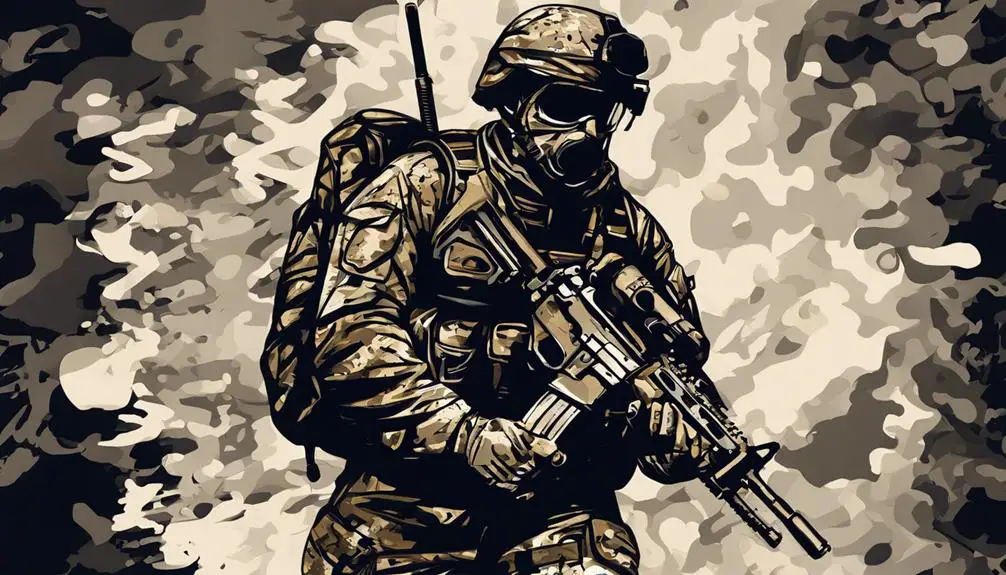You think you're ready to get schooled in badass military slang? From the trenches to the sea to the skies, warriors have been perfecting the art of verbal artillery for centuries. You'll find "foxhole" and "latrine rumor" in the trenches, "scuttlebutt" and "keelhaul" on the high seas, and "cleared hot" and "bombs away" in the air. Trash talk's not just for playgrounds; it's a tactical weapon to disrupt the enemy's OODA loop. And when you're done with the slang, you'll discover the secrets of code names and nicknames that'll leave you feeling like a boss. Buckle up, because the real deal is just getting started.
Born in the Trenches
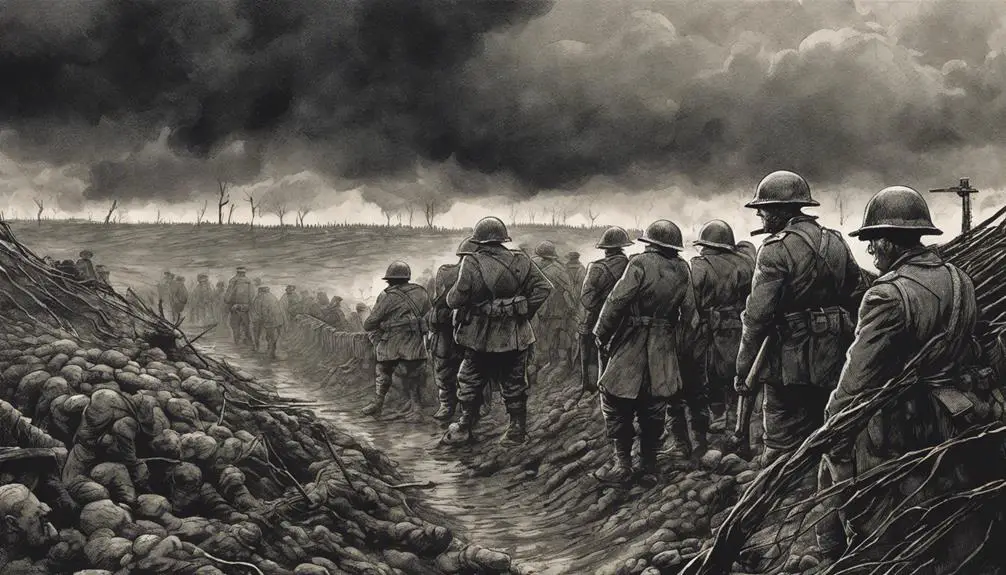
You're about to immerse yourself in the gritty world of military slang, where phrases are forged in the fire of war and tempered with a healthy dose of sarcasm and humor. Buckle up, because we're diving into the trenches, literally.
Trench life was the birthplace of some of the most iconic military slang. Imagine being stuck in a muddy hole with your buddies, waiting for the enemy to make a move. You'd develop a language that's equal parts dark humor and gallows humor, just to cope with the chaos. That's exactly what happened during World War I, where soldiers coined terms like 'trench coat' and 'dugout' to describe their makeshift homes. War origins, baby!
The trenches were the incubator for phrases that'd make a sailor blush. You'll hear soldiers tossing around terms like 'foxhole' and 'latrine rumor' like they're going out of style. It's time to get down and dirty with the gritty roots of military slang. So, grab your rifle and let's get muddy!
Slang of the Sea
Now that you've waded into the muddy trenches, it's time to set sail for the high seas, where naval warfare has spawned its own brand of salty slang. You're about to immerse yourself in the world of Deck Lingo, where salty sayings and naval nuances will have you speaking like a seasoned sailor in no time.
Here are some essential terms to get you started:
| Term | Meaning | Example
| — | — | —
| Scuttlebutt | Gossip or rumors | 'What's the scuttlebutt on the latest mission?'
| Keelhaul | To punish by dragging under the ship | 'You're gonna get keelhauled for not following orders!'
| Swab | To clean the deck | 'Get swabbing, rookie!'
| Anchor's Aweigh | To set sail | 'Anchors aweigh, we're heading out!'
From scuttlebutt to keelhauling, these salty sayings will have you sounding like a seasoned sailor in no time. So, get ready to set sail for the high seas and immerse yourself in the world of naval slang. Just remember, on the deck, clarity is key, and precision is paramount.
Airborne Lingo
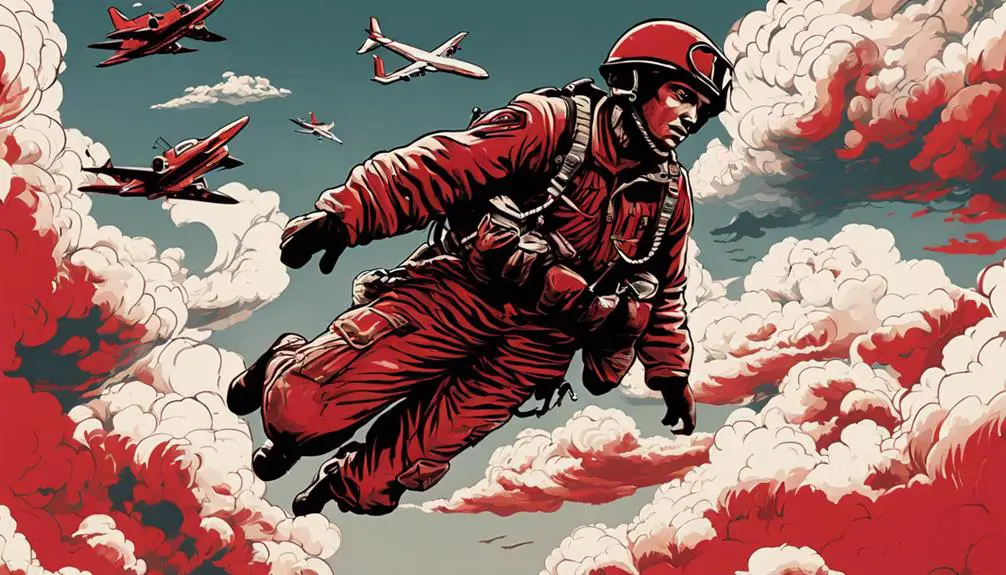
Leaving the deck behind, it's time to gear up and get airborne, where pilots and crew rely on a lexicon of lingo to navigate the wild blue yonder. You're about to enter a world where 'cleared hot' means it's go-time, and 'bombs away' isn't just a phrase – it's a reality.
As a paratrooper, you'll need to know your jump commands like the back of your hand. 'Stand up!' means it's time to get ready, while 'check static line' is a gentle reminder to make sure your parachute is securely attached. And when you're about to take the leap of faith, 'go, go, go!' is the only motivation you'll need.
You'll also pick up on paratrooper phrases like 'exit, exit, exit!' – a gentle reminder to get out of the plane already – and 'check your six,' which means keep an eye on your surroundings. And when things get hairy, 'mayday' is the universal distress call.
Tactical Trash Talk
Get ready to dish out some verbal artillery, because in the world of tactical trash talk, the goal is to get inside your opponent's OODA loop and make them eat their own words.
You're not just insulting your enemy, you're waging psychological warfare, making them doubt their own abilities and second-guess their moves. Your words are precision-guided munitions, designed to dismantle their confidence and break their spirit.
You're not just talking trash, you're conducting a psychological operation, exploiting your enemy's weaknesses and making them question their own judgment.
You're the master of enemy mocking, using their own fears and doubts against them. Your verbal jabs are calculated to provoke, to infuriate, and to demoralize.
You're not just fighting with guns and bullets; you're fighting with words, and your opponent is the target.
Code Names and Nicknames
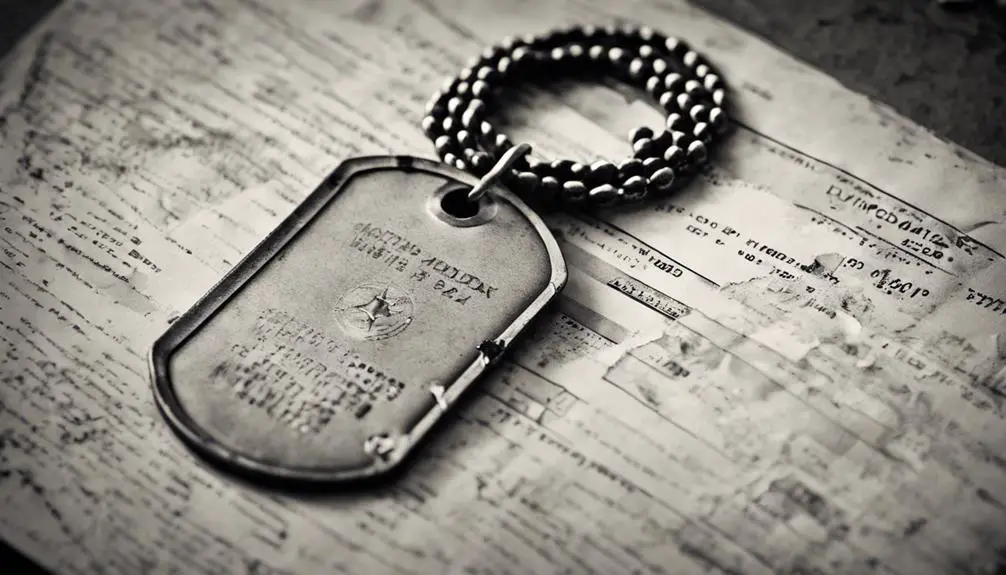
You're assigned a callsign, a nom de guerre that's as much a part of your identity as your rifle and combat boots, a label that tells the bad guys they're in for a world of hurt. It's your secret identity, your codename, your alias – the name that'll be etched on your tombstone if things go sideways.
But where do these codenames come from? Some are born from inside jokes, others from a twisted sense of humor. You might be 'Viking' because you rocked a mean beard during deployment, or 'Specter' because you're a ghost on the battlefield. Whatever the origin, your callsign becomes an integral part of who you are as a warrior. It's a badge of honor, a warning to the enemy, and a tribute to your badassery.
Radio Chatter Decoded
When you're calling in close air support or coordinating a hasty exit, every second counts, and understanding radio chatter becomes a matter of life and death. You can't afford to mess up, not even for a split second. That's why you need to be fluent in Radio Protocol 101.
First things first, you gotta know your Phonetic Alphabet – Alpha, Bravo, Charlie, and all that jazz. It's not just for show; it's to avoid confusion when communicating critical info over the airwaves. You don't want to mistake a 'B' for a 'P' when calling in artillery fire, trust me.
In radio chatter, brevity is key. You gotta be concise, clear, and quick. No time for small talk or chit-chat. You're not chatting with your buddy at the bar; you're coordinating with your team to get the job done.
Battlefield Banter
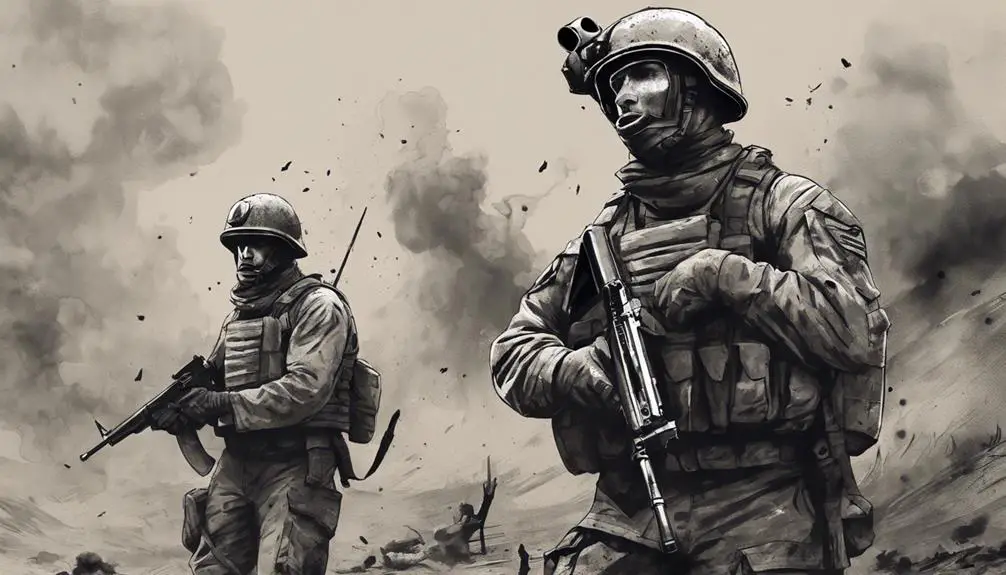
Your buddies are counting on you to keep the trash talk to a minimum and the intel flowing, so ditch the 'Hoo-ah!' and 'Oorah!' and focus on calling out enemy positions, ammo counts, and medevac requests. You're not here to win a prize for most creative insult; you're here to get the job done.
Combat humor is essential, but not at the expense of clear communication. Remember, war wisecracks are for downtime, not during a firefight. Keep it concise, keep it clear, and keep it moving.
| Situation | What Not to Say | What to Say |
|---|---|---|
| Enemy Spotted | "You're going down, ISIS!" | "Enemy position, 3 o'clock, 200 meters!" |
| Ammo Low | "I'm out of ammo, dude!" | "Ammo count: 20 rounds remaining!" |
| Medevac Needed | "Oh no, Bob's hit!" | "Medevac requested, grid 3456!" |
Get it together, soldier. This isn't a game – it's war.
Military Mottos and Catchphrases
By the time you've earned your unit's insignia, you've got their motto seared into your brain, and it's time to live up to it. You've probably heard it a million times, but when you're in the thick of it, those words become your battle cry. Military mottos and catchphrases aren't just for show; they're a symbol of your unit's identity and a reminder of what you're fighting for.
Motto evolution is a real thing, and it's fascinating to see how they've changed over time. Take the Marine Corps' 'Semper Fidelis' – it's been around since 1883, and it still gives you chills. But it's not just about the words; it's about the slogan significance behind them. When you're facing hell on earth, those three words can be the difference between life and death.
You might think it's just a bunch of words, but trust me, it's more than that. It's about pride, loyalty, and a sense of belonging. So, the next time you're about to set out on a mission, remember your unit's motto – it might just give you the edge you need to get the job done.
Frequently Asked Questions
What's the Origin of the Term "Grunt" for a Marine Infantryman?
You wanna know where the term 'grunt' comes from? Well, let me tell you, it's not because Marines are a bunch of cavemen.
The battle-hardened origins of 'grunt' date back to the Vietnam War. It's believed to have originated from the sound Marines made while hauling heavy packs during Boot camp evolution. You know, all that sweating and groaning? Yeah, that's where 'grunt' comes from.
It's a term of endearment, really.
Are Military Slang Terms Limited to the English Language?
You're dropped into a warzone, surrounded by a cacophony of foreign tongues. Newsflash: military slang isn't exclusive to English.
You'll find multilingual slang in every corner of the globe, from French 'poilus' to German 'Landser'.
Global dialects have spawned their own brand of military lingo, and it's not limited to English-speaking forces.
How Do Military Slang Terms Get Officially Recognized?
So you wanna know how military slang terms get officially recognized, huh? Well, let me tell you, it's not just about being cool and trendy.
It takes Formal Approval from the higher-ups. Once a term gains popularity, it gets added to the lexicon update, making it an official part of military language.
It's not just about being 'cool' – it's about being recognized as a legitimate part of military culture.
Can Civilians Use Military Slang in Everyday Conversation?
So, you wanna know if you can casually drop military slang into everyday convo? Go for it, but don't expect to earn street credibility from actual vets.
It's language appropriation, and it's tacky. Unless you've served, using military slang can come off as try-hard. Just be authentic, and your language will reflect that.
Don't be that poser who thinks 'HOOAH' is a casual greeting.
Are Military Slang Terms Used Universally Across All Branches?
You're wondering if military slang terms are used universally across all branches? Let's get real, they're not.
Branch variations and service differences mean that what's cool in the Army mightn't fly in the Navy. You'll find unique slang and lingo in each branch, shaped by their distinct cultures and histories.
Don't expect a Marine to use the same slang as an Airman – it's just not happening, got it?
Conclusion
You've successfully maneuvered through the trenches of military slang, traversing the complex web of lingo, codes, and banter.
Remember the story of the Navy SEAL who, during a tense standoff, radioed back to HQ, 'I'm out of ammo, but I've got plenty of attitude.'
That's what this slang is all about – a shield of humor, a sword of confidence, and a badge of honor.
It's not just talk; it's a way to survive, to thrive, and to own the battlefield.

